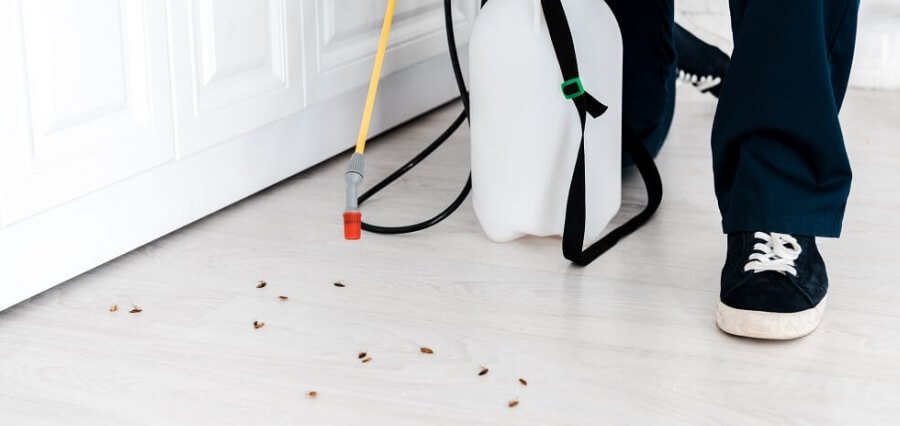Pest Control Clovis Done Right: Specialist and Reliable
Pest Control Clovis Done Right: Specialist and Reliable
Blog Article
Understanding the Numerous Methods to Bug Control: A Comprehensive Overview

Natural Bug Control Approaches
Using green strategies such as buddy planting and organic parasite control is crucial for successfully handling pests in farming settings. Companion planting entails expanding various crops in closeness to prevent insects, enhance nutrient uptake, and boost general crop wellness.
Biological pest control entails introducing all-natural killers or pathogens to regulate pest populaces. Ladybugs, for circumstances, feed upon aphids, regulating their numbers without the requirement for chemical pesticides. Another instance is the use of Bacillus thuringiensis (Bt), a microorganism that targets certain insect bugs while being harmless to human beings, animals, and advantageous pests.
These environment-friendly methods not just reduce the dependence on synthetic pesticides yet additionally help preserve biodiversity and soil wellness. By integrating all-natural pest control techniques right into agricultural methods, farmers can attain sustainable bug management while lessening negative effect on the setting.

Chemical Parasite Control Solutions
In addition to natural bug control techniques, the application of chemical insect control options plays a substantial role in efficiently handling pest populaces in farming environments. Chemical insect control options are created to target details pests that may trigger substantial damages to plants. These remedies typically have synthetic chemicals that are designed to eliminate insects swiftly and effectively.
Among the crucial benefits of chemical bug control services is their efficiency in managing insect invasions widespread. Farmers can apply these solutions using numerous approaches such as splashing, fumigation, or seed treatment to safeguard their plants from damaging bugs, weeds, and illness. In addition, chemical bug control services are fairly very easy to apply and can offer rapid results, helping farmers safeguard their returns and lessen economic losses.
However, it is important to make use of chemical insect control solutions deliberately to lessen potential adverse effects on the environment, non-target microorganisms, and human health. Correct application techniques, adherence to safety guidelines, and normal tracking are crucial to make sure the responsible use chemical insect control remedies in agricultural techniques.
Biological Insect Control Approaches
Biological insect control comes close to utilize all-natural killers or virus to manage insect populations in farming setups properly. One common biological control method is the intro of all-natural adversaries, such as ladybugs or parasitical wasps, to target specific pests.
One more biological control technique includes utilizing microorganisms like bacteria, viruses, or fungi to infect and kill pests. These microbial agents can be splashed on plants or presented right into the soil to combat different bugs without hurting valuable pests or various other wild animals. Furthermore, the use of pheromones to interfere with the mating patterns of pests is one more reliable organic control strategy. By hindering their recreation, this approach helps to reduce insect populations without the demand for chemical intervention. Overall, biological bug control methods use a lasting and targeted option to pest management in agriculture.
Integrated Bug Monitoring (IPM)
Integrated Insect Monitoring (IPM) is a thorough method that combines different bug control methods to successfully take care of and decrease pest populaces in agricultural systems. IPM concentrates on lasting prevention of insects through a mix of organic, social, physical, and chemical control approaches. By integrating these various techniques, IPM aims to reduce reliance on chemical pesticides, reduce ecological effect, and advertise sustainable insect management techniques.
One secret aspect of IPM is using organic controls such as all-natural predators, parasites, and pathogens to control pest populaces. This method takes advantage of the power of nature to keep a balance in between insects and their natural opponents without triggering injury to the setting.
Furthermore, IPM includes social practices like crop sanitation, turning, and habitat manipulation to create unfavorable problems for parasites and disrupt their life cycles. Physical controls such as mulches, traps, and barriers are likewise utilized to stop pest infestations.
Mechanical and Physical Bug Control Strategies
Utilizing non-chemical techniques, such as mechanical and physical parasite control strategies, is an important aspect of comprehensive parasite administration techniques, building on the structure of Integrated Bug Monitoring's all natural technique. Mechanical insect control entails using physical obstacles or traps to prevent parasites from accessing and harming crops or frameworks. This technique can include techniques like installing screens on windows, using row covers in agriculture, or employing sticky traps to catch pests.
Physical insect control approaches, on the various other hand, focus on directly getting rid of parasites with physical methods. For instance, utilizing warm treatments to get rid of bed bugs or vacuuming up bugs like spiders or ants can be efficient ways to take care of invasions without making use of chemicals. By incorporating these mechanical and Discover More Here physical pest control methods right into an Integrated Bug Administration strategy, people and experts can minimize reliance on chemicals while still efficiently taking care of next pest populations and lessening damage.
Final Thought

In addition to all-natural insect control methods, the utilization of chemical pest control solutions plays a considerable function in efficiently taking care of pest populations in farming settings.One of the key benefits of chemical bug control services is their performance in managing parasite infestations on a big range.Integrated Insect Administration (IPM) is an extensive strategy that combines numerous pest control methods to efficiently manage and lessen pest populaces in agricultural systems.Using non-chemical approaches, such as physical and mechanical parasite control techniques, is a critical element of comprehensive insect management methods, constructing upon the structure of Integrated Parasite Management's alternative strategy. By incorporating these mechanical and physical bug control techniques into an Integrated Insect Administration plan, professionals and people can lower dependence on pesticides while still go to this website successfully lessening and taking care of pest populations damage.
Report this page